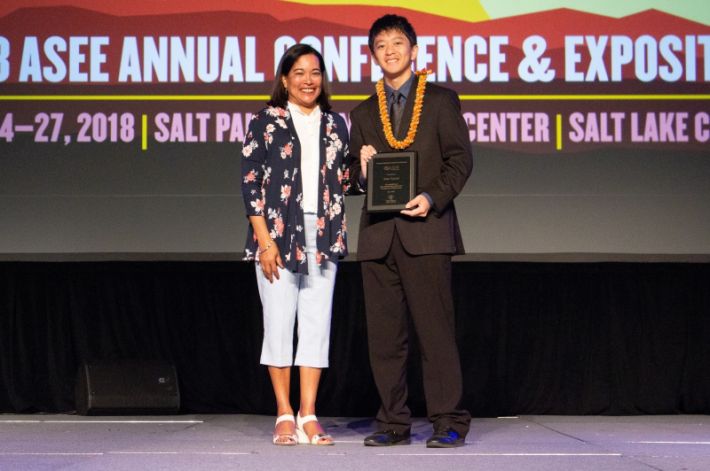Kamehameha Schools Kapālama rising senior Jake Uyechi was recently awarded the 2017 American Indian and Science and Engineering Society (AISES) Energy Challenge Grand Prize Award during the American Society for Engineering Education national conference in Salt Lake City, Utah.
The Energy Challenge is an energy-specific science fair designed to engage and encourage high school students to participate in science, technology, engineering, and mathematics (STEM) education through a creative, hands-on, engineering product development design process.
Entrants endure a rigorous scoring system and compete against a multitude of other impressive teams. The top two projects are awarded a trip to Washington, D.C. to receive their awards, present their projects to Indian Affairs leadership, and participate in educational activities during their stay in D.C.
Inspired by the challenges of kalo farmers who are mostly off-the-grid, Uyechi created a project titled ʻAnalyzing Bacteria in Microbial Fuel Cell Energy Generation.’
His project focused on the problem of high electricity costs in Hawai‘i which are more than twice that of any state across the continental U.S.
Uyechi designed and tested the best methods for farmers to use mud directly from the loʻi kalo to provide a sustainable source of energy. He used Microbial Fuel Cells (MFCs) and found what design and conditions work best for generating electricity.
“By engineering iterations of the MFC, I found that a larger surface area of the carbon electrode generated more electricity because larger biofilms could grow and produce more electrons,” said Uyechi.
“By using a thin, semi-permeable membrane, protons could travel from the anode to the cathode more efficiently, increasing the flow of electricity in the MFC. In addition to the engineering of the MFCs, I identified the communities of bacteria in the fuel cell to see how they changed. Over time, the bacteria became more anaerobic, correlating to increases in power output.”
Watch the video above to hear Uyechi talk more about his work and inspiration. Uyechi hopes to major in chemical or electrical engineering.
The annual Energy Challenge is hosted by the Office of Indian Energy and Economic Development (IEED), Division of Energy and Mineral Development (DEMD), in partnership with the AISES.

Uyechi is presented the 2017 Energy Challenge Grand Prize Award by former ASEE President Dr. Bevlee Watford, during the ASEE national conference. Photo credit: ASEE 2018 Annual Conference

The KS Kapālama senior was also recognized by U.S. Sen. Brian Schatz for his cool work in addressing electricity costs in an environmentally sustainable way. Schatz tweeted a photo with Uyechi and talked about his project.
Related stories
TAGS
sp2020 goal 1,
campus,
student achievement,
stem,
national award,
imua kamehameha,
ks kapalama
CATEGORIES
Kaipuolono Article, Themes, Culture, Leadership, I Mua Kamehameha, Kapalama Newsroom, Kapalama High School, Kapalama Home, Newsroom, Campus Programs, Kapalama
Print with photos
Print text only










